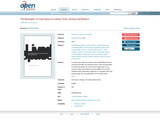
Esta es una guía para poder analizar y comprender el tema del Poder.
- Subject:
- Arts and Humanities
- Material Type:
- Homework/Assignment
- Author:
- Escarlet Rodríguez
- Date Added:
- 02/19/2020

Esta es una guía para poder analizar y comprender el tema del Poder.

Students learn about the Foucault pendulum an engineering tool used to demonstrate and measure the Earth's rotation. Student groups create small experimental versions, each comprised of a pendulum and a video camera mounted on a rotating platform actuated by a LEGO MINDSTORMS(TM) NXT motor. When the platform is fixed, the pendulum motion forms a line, as observed in the recorded video. When the rotating, the pendulum's motion is observed as a set of spirals with a common center. Observing the patterns that the pendulum bob makes when the platform is rotating provides insight as to how a full-size Foucault pendulum operates. It helps students understand some of the physical phenomena induced by the Earth's rotation, as well as the tricky concept of how the perception of movement varies, depending on one's frame of reference.

In a brief essay called Des espaces autres (1984) Michel Foucault announced that after the nineteenth century, which was dominated by a historical outlook, the current century might rather be the century of space. His prophecy has been fulfilled: the end of the twentieth century witnessed a ‘spatial turn’ in humanities which was perhaps partly due to the globalisation of our modern world. Inspired by the spatial turn in the humanities, this volume presents a number of essays on the ideological role of space in literary texts. The individual articles analyse ancient and modern literary texts from the angle of the most recent theoretical conceptualisations of space. The focus throughout is on how the experience of space is determined by dominant political, philosophical or religious ideologies and how, in turn, the description of spaces in literature is employed to express, broadcast or deconstruct this experience. By bringing together ancient and modern, mostly postcolonial texts, this volume hopes to stimulate discussion among disciplines and across continents. Among the authors discussed are: Homer, Nonnus, Alcaeus of Lesbos, Apollonius of Rhodes, Vergil, Herodotus, Panagiotis Soutsos, Assia Djebar, Tahar Djaout, Olive Senior, Jamaica Kincaid, Stefan Heym, Benoit Dutuertre, Henrik Stangerup and David Malouf.

This subject examines the ways in which we read. It introduces some important strategies for engaging with literary texts developed in the twentieth century, paying special attention to poststructuralist theories and their legacy. The course is organized around specific theoretical paradigms. In general, we will: (1) work through the selected readings in order to see how they construe what literary interpretation is; (2) locate the limits of each particular approach; and (3) trace the emergence of subsequent theoretical paradigms as responses to what came before.

In the decades following the Second World War, a cluster of extraordinary French thinkers were widely translated and read in American universities. Their works were soon labeled as "French Theory." Why would sharing the same nationality make authors such as Lacan, Cixous, Derrida, Foucault or Debord, ambassadors of a specifically "French" theory? The course will explore the maze of transatlantic intellectual debates since 1945 and the heyday of French existentialism. We will study the debates on communism, decolonization, neo‐liberalism, gender, youth culture and mass media. This course is taught in English.